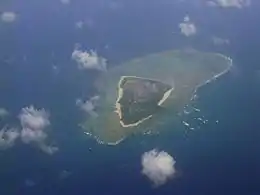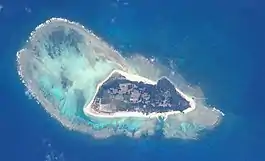Minna Island (Tarama, Okinawa)
Minna Island, or Minnajima (水納島), (Miyako: Minna) is an island in the Miyako Islands in the jurisdiction of Tarama, Miyako District, Okinawa Prefecture, Japan.
| Native name: 水納島 | |
|---|---|
 Minnajima | |
| Geography | |
| Coordinates | 24°45′17″N 124°41′42″E |
| Archipelago | Miyako Islands |
| Adjacent bodies of water | East China Sea |
| Area | 2.16 km2 (0.83 sq mi)[1] |
| Administration | |
| Prefecture | Okinawa Prefecture |
| Demographics | |
| Population | 5 (2015 national census)[1] |
Geography
Minnajima is part of the Miyako Islands and is 8 km north of Tarama Island. The island is surrounded by an atoll, primarily spreading to the west, with the East China Sea to the north and the Pacific Ocean to the south.[2]
History
Minnajima was historically host to a fishing village, with the local population reaching more than 200 adults. Due to regular typhoon damage and water shortages, The majority of the residents of Minnajima were relocated to the Takano district of Hirara in 1961.[3][4]
A lighthouse was built on the southeastern portion of the island, first lit in 1972. The light is 21m above sea level and is visible up to a distance of 12.0 nautical miles.[5]
As of 2016, there are 5 residents who raise over 100 cattle on the island.[6]
- 1734 - Hisashiya Asatoshi was executed, and his eldest son was exiled to Minna Island.[7]
- 1771 - The Great Yaeyama Tsunami devastated the island.[8]
- 1900 - A branch school was set up on the island.[7]
- 1961 - A majority of the residents were relocated.[4]
- 1978 - The branch school closed.[7]
- 1983 - A fresh water supply facility was completed.[7]
- 1989 - Submarine power transmission from Tarama to the island.[7]
- 2011 - Tarama Prefectural Natural park is established around Tarama and Minna Island.[9]
Historic Sites
- Sakishima Beacons National Historic Site.[10]

Infrastructure
- Electricity is transmitted through submarine cables from a power station on Tarama Island.☃☃Electricity is transmitted through submarine cables from a power station on Tarama Island.[2]
- A combination of groundwater purification and rainwater collection is used to provide fresh water to the island.[11]
- Telephone cables have been run to the island,[12] and cellphone service through NTT Docomo is available over the entire island.[13]
- Two cottages and multiple campsites are available for visitors, but food will have to be prepared in advance, as there are no shops on the island.[14]
- A heliport was built next to the lighthouse, but is only used by the Japan Coast Guard in an emergency.[3]
- Access to the island is provided by ship from Tarama Island.[2][3][15]
See also
References
- "Remote island related materials (離 島 関 係 資 料)" (PDF). Archived (PDF) from the original on 2020-02-15. Retrieved 2020-02-15.
- "第3次多良間村総合計画 後期基本計画" (PDF). 沖縄県多良間村. 2009.
- 日本の島ガイド SHIMADAS(シマダス) 2nd edition. Japan Remote Island Center. 2004. pp. 1266–1267. ISBN 4931230229.
- "水納御嶽、全面改築目指す - 琉球新報 - 沖縄の新聞、地域のニュース". 琉球新報. 1997-07-09.
- "宮古水納島灯台". Retrieved 2020-08-25.
- "森と海の幸を恵みに/高野集落". 宮古毎日新聞. 2011-02-05.
- "多良間の歴史". 多良間公式ウェブサイト. Retrieved 2020-08-25.
- "前山の「津波碑」(行雲流水)". 宮古毎日新聞. 2011-04-08.
- "多良間県立自然公園". 沖縄県. Retrieved 2020-08-25.
- "文化財課要覧(平成26年度版) VIII 文化財保護" (PDF). 沖縄県教育庁文化財課、p.77.
- "沖縄県水道整備基本構想 ~おきなわ水道ビジョン~" (PDF). 沖縄県. 2012.
- "条件不利地域におけるブロードバンド化促進のための調査研究会報告書 ~小規模離島等4島のブロードバンド化に向けて~" (PDF). 条件不利地域におけるブロードバンド化促進のための調査研究会. 2009.
- "Coverage Map [NTT Docomo]". Retrieved 2020-08-25.
- "水納島(宮古)". Retrieved 2020-08-25.
- "新造船「みんな」寄港/水納・多良間島で運航". 条件不利地域におけるブロードバンド化促進のための調査研究会. 2019-04-05.
